Toyota RAV4 (XA40) 2013-2018 Service Manual: Bleeding
Hint:
If any work is performed on the brake system or if air in the brake lines is suspected, bleed air from the brake system.
Notice:
Wash off brake fluid immediately if it comes in contact with any painted surface.
- Remove cowl top ventilator louver bracket lh
- Detach the 6 claws and remove the bracket.
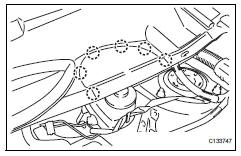
- Fill reservoir with brake fluid
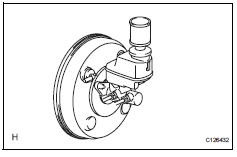
- Set the brake fluid can upside down on the reservoir.
Fluid: sae j1703 or fmvss no. 116 Dot3
Notice:
- Make sure there is sufficient brake fluid in the can.
- After adding brake fluid, make sure the reservoir is sufficiently full.
- Bleed air from brake master cylinder
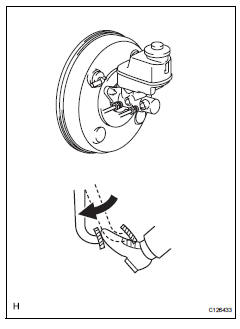
Hint:
If the master cylinder has been disassembled or if the reservoir becomes empty, bleed air from the master cylinder.
- Using sst, disconnect the 2 brake lines from the master cylinder.
Sst 09023-00101
- Slowly depress and hold the brake pedal.
- Block the outer holes with your fingers, and release the pedal.
- Repeat the 2 previous steps 3 or 4 times.
- Using sst, connect the 2 brake lines to the master cylinder.
Sst 09023-00101
Torque: 15.2 N*m (155 kgf*cm, 11 ft.*Lbf) without sst
14 N*m (144 kgf*cm, 10 ft.*Lbf) with sst
Hint:
Use a torque wrench with a fulcrum length of 30 cm (11.81 In.).
- Bleed air from brake line
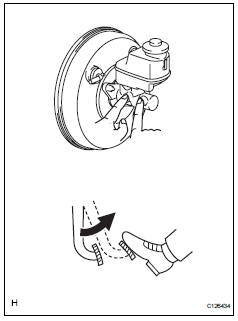

- Remove the bleeder plug cap.
- Connect the vinyl tube to the bleeder plugs.
- Depress the brake pedal several times, and then loosen the bleeder plug with the pedal depressed.
- When fluid stops coming out, immediately tighten the bleeder plug. Then release the pedal.
- Repeat the 2 previous steps until all the air in the brake fluid is gone.
- Tighten the bleeder plug.
Torque: 8.3 N*m (85 kgf*cm, 73 in.*Lbf)
- Install the cap.
- Bleed air from the brake line for each wheel by repeating the above procedures.
- Bleed air from abs and traction actuator assembly
Notice:
After bleeding the air from the brake system, if the height or feel of the brake pedal cannot be obtained, perform air bleeding of the brake actuator with the intelligent tester by following the procedure below.
- Depress the brake pedal more than 20 times with the engine off.
- Connect the intelligent tester to the dlc3, and turn the ignition switch on.
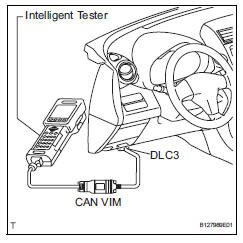
Notice:
Do not start the engine.
- Select air bleeding on the intelligent tester.
Hint:
Refer to the intelligent tester operator's manual for further details.
- Bleed the air out of the suction line.
Notice:
- Perform the bleeding at the right front wheel and right rear wheel.
- Bleed the air by following the steps displayed on the intelligent tester.
- Connect a vinyl tube to the bleeder plug at the right front wheel or the right rear wheel.
- Loosen the bleeder plug.
- Operate the brake actuator to bleed the air using the intelligent tester.
Notice:
Release the brake pedal at this time.
Hint:
This operation stops automatically after 4 seconds.
- Check if the operation has stopped by referring to the intelligent tester display.
- Temporarily tighten the bleeder plug.
- Repeat the 4 previous steps until all air in the fluid is completely bled out.
- Tighten the bleeder plug.
Torque: 8.3 N*m (85 kgf*cm, 73 in.*Lbf)
- Repeat all of the above procedures for the right rear wheel to bleed the air out of the suction line.
- Bleed the air out of the pressure reduction line.
Notice:
- Perform the bleeding at the 4 wheels.
- Bleed the air by following the steps displayed on the intelligent tester.
- Connect a vinyl tube to either one of the bleeder plugs.
- Loosen the bleeder plug.
- Using the intelligent tester, operate the brake actuator assembly, completely depress the brake pedal and hold it there.
Notice:
- During this procedure, the pedal will feel heavy, but completely depress it so that the brake fluid comes out of the bleeder plug.
- Depress and hold the brake pedal. Do not depress and release the pedal repeatedly.
Hint:
The operation stops automatically after 4 seconds. When performing this procedure continuously, set an interval of at least 20 seconds.
- Tighten the bleeder plug, then release the brake pedal.
- Repeat the 3 previous steps until all air in the fluid is completely bled out.
- Tighten the bleeder plug.
Torque: 8.3 N*m (85 kgf*cm, 73 in.*Lbf)
- Repeat all of the above procedures for the other wheels to bleed the air out of the pressure reduction line.
- Check brake fluid level in reservoir (see page br-6)
- Install cowl top ventilator louver bracket lh
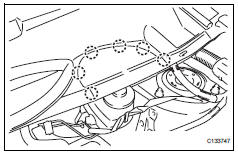
- Attach the 6 claws to install the bracket.
 On-vehicle inspection
On-vehicle inspection
Check brake fluid level in reservoir
Check the fluid level and add fluid if necessary.
Fluid:
sae j1703 or fmvss no. 116 Dot3
Hint:
Add fluid to a level between the reservoir's min ...
 Brake pedal
Brake pedal
Components
Removal
Disconnect cable from negative battery
terminal
Caution:
Wait at least 90 seconds after disconnecting the
cable from the negative (-) battery terminal to
preven ...
Other materials:
Installation
Install engine coolant temperature
sensor
Install a new gasket onto the sensor.
Using sst, install the sensor.
Sst 09817-33190
torque: 19.6 N*m (200 kgf*cm, 14 ft.*Lbf)
Connect the sensor connector.
Install air cleaner case (see page es-431)
Install air cleaner cap ( ...
Maintenance requirements
To ensure safe and economical
driving, day-to-day care
and regular maintenance
are essential. It is the
owner's responsibility to
perform regular checks.
Toyota recommends the following
maintenance:
â– Repair and replacement
It is recommended that genuine
Toyota parts be used for repairs to
ensure ...
Disassembly
Remove no. 3 Heater to register duct
Detach the 6 claws and remove the heater to
register duct.
Remove air duct
Detach the 2 claws and remove the air duct.
Remove air outlet control servo motor
Remove the 3 screws.
Detach the evaporator case from the ...
